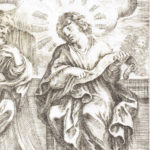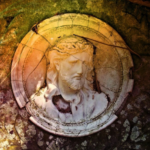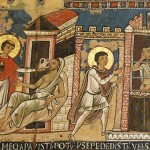We run our website the way we wished the whole internet worked: we provide high quality original content with no ads. We are funded solely by your direct support. Please consider supporting this project.

The Entire Old Testament is About Jesus
Jesus himself taught that he carried more authority than any prophet that predated him. Though Jesus regarded John as the greatest prophet up to himself (Matt 11:11), he claimed his own “testimony” was “weightier (megas) than that of John” (Jn. 5:36). Jesus certainly wasn’t denying John or any previous true prophet was divinely inspired. But he just as clearly was claiming that his revelatory authority trumped everything leading up to him.
In fact, in this same passage Jesus goes so far as to claim that he is the ultimate subject matter of previous revelations. In the course of confronting the Pharisees, he says: “You study the Scriptures diligently because you think that in them you possess eternal life. These are the very Scriptures that testify about me, yet you refuse to come to me to have life” (5:39-40). For this reason Jesus claimed that Moses would serve as their “accuser,” exposing their unbelief. For, Jesus added, “If you believed Moses, you would believe me, for he wrote about me” (5:45-46, emphasis added).
Jesus made the same point to certain disciples after his resurrection. After chiding them for being “slow to believe all that the prophets” had spoken about him, Jesus explained his death and resurrection by teaching them that “[e]verything” that was written about him in “the Law of Moses, the Prophets and the Psalms” had to be “fulfilled.” And in this way “he opened their minds so they could understand the Scriptures” (Lk 24:25, 44-45). In Jesus’ day, the phrase, “the Law, Prophets and Psalms” was widely used to refer to the whole OT.
So too, when Jesus explains his death and resurrection by associating them to what “must be fulfilled” (vs.44) and to “what is written” (vs. 46), he is alluding to the essence of the entire OT Scriptures, and not merely to a few verses that predicted these things. The same could be argued when Luke says Jesus “explained to them what was said in all the Scriptures concerning himself” (vs.27) and when he concludes that Jesus “opened their minds so they could understand the Scriptures” (vs.45). Throughout the passage, Jesus has the entire OT in view, not just selections from it. Thus we can conclude with Graeme Goldsworthy that “Jesus says the whole Old Testament, not merely a few selected texts, is about him.”[1]
On this basis, Poythress concludes that this “particularly important” passage is intended to teach that “Christ himself indicates that the Old Testament from beginning to end is about himself” and that “[t]he whole of the Old Testament … has as its central message the suffering and resurrection of Christ.”[2] David Dockery also concludes from this passage that “[f]or Jesus, the key to understanding the Old Testament was located in his own life and work, for everything pointed to himself.”[3]
Hence, this passage, as well as the earlier mentioned Johannine passage, force us to conclude that, regardless of how “diligently” one studies the Old Testament, one can’t be said to have arrived at the full, complete interpretation of any passage until they have disclosed how it bears witness to the one who is the ultimate revelation of God. Since Jesus’ testimony is “weightier” than John the Baptist, and therefore “weightier” than all preceding speakers, the revelation that comes through Jesus must never be placed alongside of any others. Rather, all others must be interpreted in light of the revelation that comes through Jesus.
[1] Goldsworthy, Gospel-Centered Hermeneutics, 252.
[2] Poythress, God Centered, 60
[3] D. S. Dockery, Biblical Interpretation Then and Now, 26.
Photo via Visualhunt
Category: General
Tags: Bible Interpretation, Cruciform Theology, Old Testament
Topics: Biblical Interpretation
Related Reading

The Bible is NOT the Foundation
Many people imagine that the foundation of their faith is the Bible. This is viewed as the ultimate center around which everything they believe revolves. However, the foundation of the Christian faith is actually centered on a person, not a book. Whereas Islam has always presented itself as a “religion of the book,” the kingdom…

Podcast: By Celebrating Passover, Isn’t Jesus Tacitly Approving the Sacrificial System Passover Was Based On?
Is Jesus for or against slaughtering babies? Greg talks about exodus and sacrifice. http://traffic.libsyn.com/askgregboyd/Episode_0405.mp3

When God Endorsed Polygamy
We often find God acting as if he supports things we know, by other means, that he does not. For example, though his ideal was monogamy, it’s clear in the biblical narrative that, once God decided to permit men to acquire multiple wives and concubines, he was not above bearing the sin of his people…

Overemphasizing Christ?
In response to my work, some have argued that I tend to overemphasize Christ. In light of the claim that in Jesus we have the one and only definitive Word of God and that no previous revelation should ever be placed alongside him or allowed to qualify what he reveals about God, some allege that…

The Call to a Cruciform Life
Jesus repeatedly taught that following him meant that one had to be willing to “pick up their cross daily and follow [him]” (Lk 9:23; 14:27). Picking up our cross is the centerpiece of following Jesus because this was the centerpiece of what Jesus was all about. The thematic centrality of the cross is also illustrated…

The Twist that Reframes the Whole Story
Many people read the Bible as if everything written within it is equally authoritative. As a result, people read it along the lines of a cookbook. Like a recipe, the meaning and authority of a passage aren’t much affected by where the passage is located within the overall book. The truth, however, is that the…
